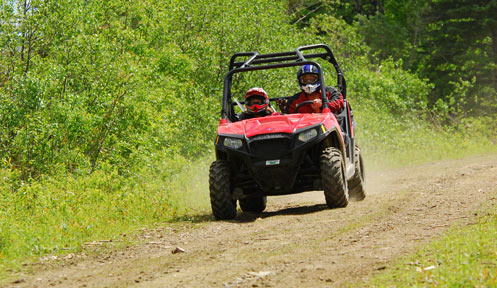By PAULA TRACY, InDepthNH.org
CONCORD – Off highway recreational vehicle enthusiasts put together a bill that would create a process to allow expanded riding on state roadways in five counties to access gas and other trails, while also shifting the abutter notification cost burden from the applicant to the municipality for new road inclusions.
But it looks like it has stalled before getting to the full House.
The House Resources, Recreation and Development Committee held a public hearing Feb. 12 on House Bill 683 and heard both sides from OHRV club leaders to conservation organizations.
While there were 16 who testified in person both in favor and opposed, there were 376 who registered online in opposition to the bill and 298 who supported it.
After hearing the bill last Wednesday, the committee has since recommended that it be killed on a vote of 14-1. Opposing the motion was Rep. Arnold Davis, R-Berlin.
It now goes before the full House of Representatives for a vote but is on the consent calendar.
Rep. Suzanne Vail, D-Nashua, recommended the measure be killed noting that it should first be considered by a commission that was set up in 2022 to address such matters. She noted it was creating a process that the counties might first want to become aware of before it passed and the idea of transferring liability on notification for any new roads to be included should be vetted by that legislatively created OHRV committee.
Abby Evankow of Gorham also opposed the bill.
“It was disappointing that none of these OHRV bills went through the current HB 1188 OHRV Study Commission to be evaluated first, Evankow said by email, adding the commission’s membership is carefully made up to include all stakeholders.
Rep. Michael Ouellet, R-Colebrook, prime sponsor of several of the session’s OHRV bills is the current chairman, but he did not have the commission vet them, she said.
“I am relieved (and surprised) that the House RRD committee voted 14:1 to ITL HB 683,” Evankow said.
Opposing the bill were a number of conservation groups, property rights organizations and the state’s Fish and Game Department, which is charged with enforcement.
Following the decision, the Sierra Club urged members to send committee members a valentine last Friday saying the bill was bad because: it would enable cost shifting, could silence abutters and spread OHRV use to “unsuspecting counties…with predictable, costly and harmful consequences.”
The measure, sought by the bill’s sponsor Rep. Ouellet, would create a process that is used in Coos and Grafton counties and was crafted during the development of “Ride the Wilds,” an interconnected map of riding in the state’s Great North Woods.
Steve Wilkie, who represented the all-terrain vehicle clubs as part of the New Hampshire Off Highway Vehicle Association, said there would be verified notification of abutters but the bill would take the cost away from the non-profit clubs, many of whom in the rest of the state are small and have few members to spread out the cost. It allows towns to have a process to approve not only on town roads which they already have authority over but on state roads and remove if trouble exists, roads both local and state for combined use.
Currently the state allows such use in Coos and Grafton counties but this enabling legislation would extend that to Carroll, Sullivan, Cheshire, Hillsborough and Merrimack counties.
He said groups in Croydon, Washington, Windsor and Antrim are interested in having the same options that are available in the north.
Wilkie said ATV riders do not want to recreate on roads but merely access gas stations or other riding areas which are not connected by trails.
Ann Davis of Wilmot, a member of a legislative study committee which since 2022 has been looking at ways to mitigate conflict with OHRV use, said the NHOVAs did not bring forth this suggested legislation for consideration to the committee and it has not endorsed any bills in this legislative session.
A member of the New Hampshire Timberland Owners Association and the Farm Bureau Federation, Davis opposed the bill as adding expense to municipalities, saying the applicant should be required to notify abutters of a proposed change. She said law enforcement, including Fish and Game, does not currently have enough resources to fully enforce OHRV laws and she saw dangers associated with allowing this bill to go forward.
New Hampshire Fish and Game Capt. Michael Eastman, who is the departments OHRV coordinator, said he spoke for the Fish and Game Commission in opposing the bill saying he has worked the past six year “to get OHRV off the roads” and said the existing law was hastily drafted to allow for “Ride the Wilds” and it was “thrust on the state without a lot of planning.”
The bill’s fiscal note indicated an “indeterminable” cost for implementation but estimated it would likely cost less than $10,000.
Here are the other bills before the legislature: https://gc.nh.gov/bill_status/results.aspx?adv=2&txttext=OHRV





